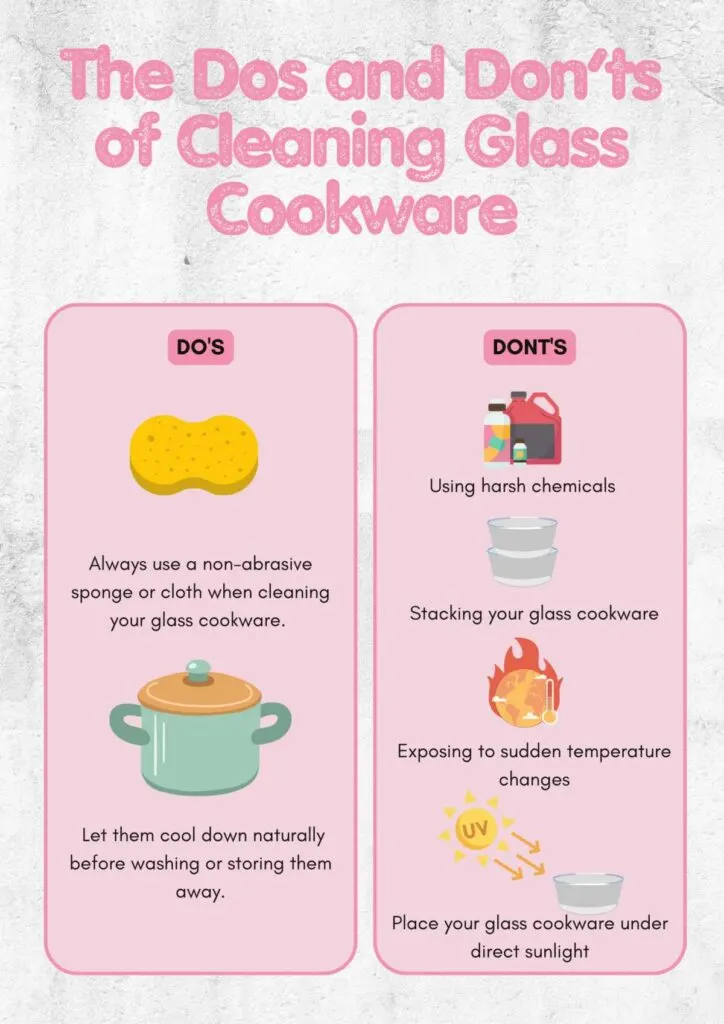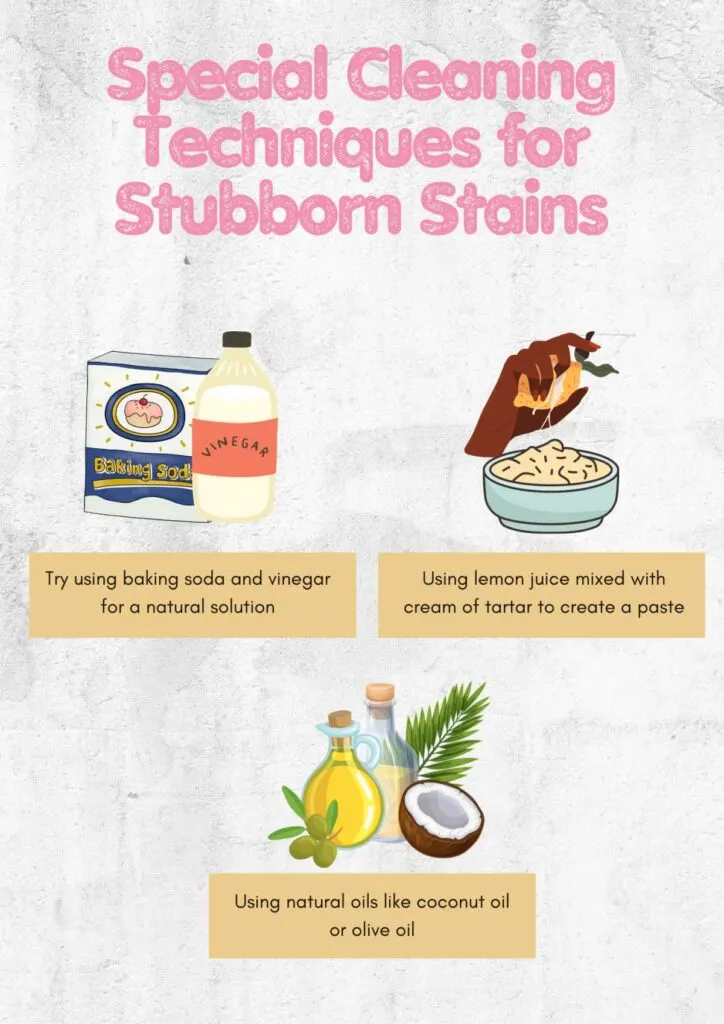I love cooking with my glass cookware. Not only does it look beautiful, but it’s also versatile and easy to clean.
However, cleaning glass cookware can be challenging if you don’t know how to do it properly. Over the years, I’ve learned some dos and don’ts that have helped keep my glass cookware looking new.
First and foremost, handle your glass cookware carefully. Glass is delicate and can easily crack or break if mishandled. Before you start cleaning, ensure your hands are dry so you have a good grip on the cookware.
Also, avoid using metal utensils when cooking or cleaning as they can scratch the surface of the glass, making it more susceptible to cracking over time. Taking these simple precautions ensures that your glass cookware lasts for years while keeping your food free from harmful chemicals in non-stick materials.
Handle with Care: The Dos and Don’ts of Cleaning Glass Cookware

When handling your delicate glass cookware, it’s important to know the dos and don’ts of keeping them in tip-top shape.
Always use a non-abrasive sponge or cloth when cleaning your glass cookware to avoid scratches on the surface. Be gentle when scrubbing stubborn stains, and avoid using harsh chemicals that can damage the surface.
It’s also best to avoid stacking your glass cookware as this may cause scratches or cracks from rubbing against each other.
Preventing discoloration is another crucial factor in maintaining your glass cookware’s quality. Be careful not to subject them to abrupt changes in temperature, like setting warm glass cookware directly onto a chilly counter or the other way around. Instead, let them cool down naturally before washing or storing them away.
Additionally, never place your glass cookware under direct sunlight for extended periods, as this may lead to discoloration over time.
By following these simple tips, you can ensure that your glass cookware stays looking brand new and lasts for years to come!
Pre-Cleaning Preparation
Before I start cleaning my glass cookware, I always prepare it properly. The first step is to remove any leftover food or debris from the vessel’s surface. This is important for both glass cookware safety and effective cleaning.
If there are any stubborn stains or burnt-on food, I’ll soak the vessel in warm water for a few minutes before scrubbing it with a soft sponge.
Once the surface is debris-free, I choose the right cleaning products for my glass cookware. It’s important to avoid harsh chemicals that can scratch or damage the surface of the glass. Instead, I use gentle cleaners like dish soap or baking soda mixed with water.
These cleaners effectively remove stains and leave my glass cookware looking brand new without causing any harm. By following these pre-cleaning preparation steps, I can ensure that my glass cookware stays in great condition and lasts longer.
DIY Cleaning Solutions
When it comes to DIY cleaning solutions, there are a few methods that I swear by for cleaning glass cookware.
First, I always reach for baking soda and vinegar. This powerful combination works wonders on tough stains and leaves my glass cookware looking as good as new.
Another go-to cleaning solution is lemon juice, which helps remove stubborn grime and leaves my glass cookware sparkling clean.
Baking Soda and Vinegar

You’ll love how effortless it is to get your glass bakeware looking brand new again with the powerful combination of baking soda and vinegar. This dynamic duo works together to break down grime, grease, and baked-on food particles that stubbornly cling to your cookware. The best part? It’s an all-natural solution that won’t harm you or the environment.
To start, sprinkle a generous amount of baking soda onto the surface of your glass cookware. Make sure to cover all areas that need cleaning thoroughly. Then, pour white vinegar over the baking soda until it fizzes and bubbles. Wait a few minutes while it works its magic before scrubbing with a sponge or brush.
Rinse with warm water and dry with a clean towel. Voila! Your glass cookware will look as good as new in no time.
If you don’t have any baking soda on hand, there are other alternatives, such as cream of tartar or lemon juice, that can work just as well. However, be cautious when using vinegar as it is highly acidic and can damage certain surfaces if left on too long.
Do a patch test beforehand or dilute it with water before use if you’re unsure how your glass cookware will react to it. With these safety precautions in mind, this cleaning solution is an easy and effective way to keep your kitchen essentials sparkling clean without harsh chemicals or expensive products.
Lemon Juice and Salt

Get ready to taste the sweetness of victory with the zestiness of lemon juice that will leave your kitchen smelling fresh and clean.
As someone who prefers natural cleaning alternatives, I’ve found that lemon juice works wonders in removing stubborn stains from glass cookware. The citric acid in lemon juice breaks down grime.
Using this method is simple. First, mix lemon juice with warm water. Make sure to add this solution to a spray bottle. Then, use a scrub brush to remove the stain.
Wash thoroughly using tepid water and pat dry with a gentle fabric. This method effectively removes stains and leaves behind a refreshing citrus scent that lingers in your kitchen long after cleaning.
Special Cleaning Techniques for Stubborn Stains

If you’re struggling to remove tough stains from your glass cookware, try using baking soda and vinegar for a natural solution that can work wonders.
Initially, dust the area with stains using baking soda and let it settle briefly. Then, pour vinegar over the baking soda and watch as it fizzes up and breaks down the stain. Scrub gently with a non-abrasive sponge or brush, rinse thoroughly with water, and dry.
But if you’re looking for some alternatives to baking soda, there are other natural solutions you can try as well.
One option is using lemon juice mixed with cream of tartar to create a paste that can be applied to stubborn stains.
Another option is using natural oils like coconut or olive oil to help loosen tough stains before cleaning them with soap and water.
With these special cleaning techniques in your arsenal, your glass cookware will always look sparkling clean!
Drying and Storing Glass Cookware
Air-drying glass cookware is important to prevent water spots and streaks from forming on the surface.
I like to place my glass cookware upside down on a clean dish towel or drying rack to ensure that the inside and outside dry completely.
When storing, it’s crucial to stack the pieces carefully with a layer of protective padding between them to prevent scratches or cracks.

Air Drying
Make sure to handle the cookware with care while drying it, as glass is prone to breakage. Air drying is one of the most effective and practical ways to dry glass cookware.
Here are some benefits of air drying your glass cookware:
- No need for additional equipment: Unlike other methods that require towels or cloths, air drying only needs a rack or a clean counter.
- Saves time: You don’t have to spend time wiping off excess water from your cookware, which can be tedious and time-consuming.
- Prevents streaks: Air drying minimizes streaking on glass surfaces since there’s no rubbing involved.
- Safe method: Air drying eliminates the risk of using towels or cloths that may leave fibers on your cookware surfaces.
- Energy-efficient: If you opt for air-drying instead of dishwashers or cloth/towel drying, you’ll save money and energy.
While air drying is considered one of the best ways to dry glass cookware, you can use alternatives if you don’t have adequate space for air drying.
For example, you can use microfiber cloths specifically designed for cleaning glasses. They’re extra absorbent and won’t scratch your cookware surface. Alternatively, you could use paper towels but avoid rough ones that may damage the surface.
Proper Storage
To maintain the quality of your newly-dried glass cookware, storing them properly in a designated area free from any potential damage is important.
Glass cookware storage ideas can vary depending on the amount and type of cookware you have. One tip for organizing cookware is to group similar items, such as all baking dishes or mixing bowls. This will make it easier to find what you need when cooking and prevent accidental damage when retrieving something from a crowded cabinet.
Another important aspect of proper storage for glass cookware is ensuring that each piece has enough space around it to avoid any bumping or knocking into other items. A simple solution is using dividers or separators within cabinets or drawers specifically designed for dish organization.
Additionally, consider storing lids separately from their pots or pans to prevent scratching and chipping. By following these tips, you can ensure that your glass cookware stays in top condition and is ready for use whenever needed.
Maintenance Tips for Long-Term Use
Regular upkeep is essential to ensure your glass pots and pans remain in top condition for many years.
One of the most important aspects of maintaining glass cookware is cleaning frequency. It’s crucial to clean your glass cookware after every use, as it prevents any buildup of food residue or stains. If left uncleaned, these residues can result in scratches or permanent marks on the surface of your pots and pans.
When choosing the right cleaning tools for your glass cookware, there are a few things to keep in mind. Firstly, avoid using abrasive cleaners such as steel wool or scouring pads, as they can scratch the surface of your pots and pans. Instead, opt for soft sponges or non-abrasive scrubbing brushes that won’t damage the glass.
Consider using a gentle dish soap solution with warm water when cleaning your cookware. This will help break down any food residue without causing any harm to the surface of the glass material.
Following these simple maintenance tips, you can enjoy long-term use of your beloved glass pots and pans!
Conclusion
Overall, cleaning glass cookware requires a bit of effort and attention to detail. However, it can be straightforward with the right tools and techniques.
Remember to handle your glass cookware carefully during both use and cleaning, as it’s delicate and can break easily. Before cleaning, prepare your supplies and choose the appropriate cleaning solution for your specific needs.
Whether you opt for DIY solutions or store-bought options, always test on a small area first to ensure compatibility. Don’t forget to dry and store your glass cookware properly to prevent damage or scratches.
By following these guidelines, you can maintain the longevity of your glass cookware while keeping it clean and shiny after each use.

